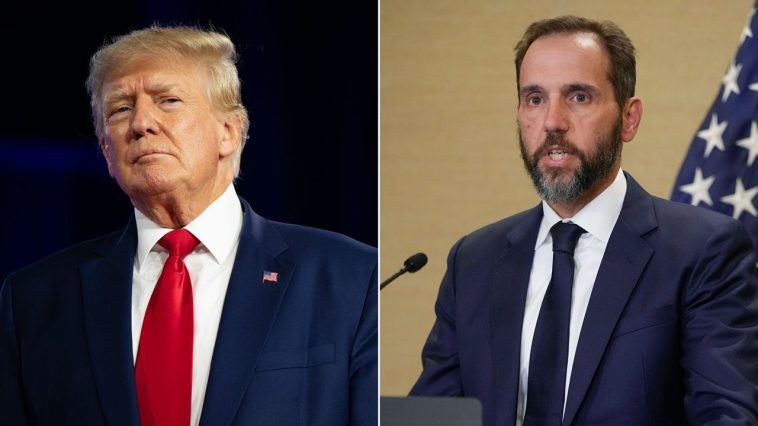LISTEN HERE:
The High Court has chosen not to preemptively intervene in ex-President Donald Trump’s claim to prosecutorial immunity, rejecting a plea from special counsel Jack Smith. By issuing a succinct order on Friday, the court declined to sanction a certiorari before judgment, effectively permitting the case to proceed to the federal appeals court.
This development aligns with the preference expressed by Trump’s legal representatives and successfully keeps the Supreme Court out of the case at this stage. Pending further developments, this could impact the originally planned March 4 trial date.
Trump has pushed for the case to be dismissed, basing his argument on the assertion that he benefits from ‘absolute immunity’ against any charges for actions he took while holding the highest office in the nation.
Earlier this month, Smith requested the High Court’s immediate intervention and a swift judgment on the matter. He sought a potential historical decision that would establish whether a previous U.S. president can face prosecution for actions carried out during their tenure.
Trump’s lawyers encouraged the Supreme Court to dismiss the special counsel’s appeal, suggesting that the federal appeals court should have the first opportunity to review the issues. They continued to argue in favor of permitting the process to follow its traditional course, requesting that the appeals court initially handle the matter.
On the matter of the charges themselves, Trump entered a plea of not guilty in August. He was accused of orchestrating a ‘criminal strategy’ designed to challenge the legitimacy of the 2020 election results. His purported modus operandi involved a series of actions, each working towards the single goal of undermining the democratic process.
The charge sheet detailed the enlistment of dubious ‘alternative electors’, the questionable use of the Justice Department to undertake supposed ‘election crime investigations’ and appeals to the vice president to ‘alter election outcomes’. Each of these steps was seemingly designed with the ultimate aim of enabling Trump to retain power, despite the electoral verdict of the American people.
As the turbulence of January 6 unfolded, the former president was also accused of propagating unfounded allegations of election theft. These charges compound the litany of offenses he stands accused of, portraying an image of a leader prepared to question the very democratic principles he was elected to uphold in his pursuit of power.
Throughout this, Trump has steadfastly maintained his innocence. He has refuted all allegations of misconduct and insisted that the charges amount to an orchestrated campaign of persecution, targeting him for his political stance.
Trump’s steadfast belief in his own immunity from prosecution introduces an intriguing element to this ongoing legal saga. Should the case proceed to trial and result in a conviction, this would represent an unprecedented instance of a former president being held legally accountable for actions committed while in office. Not only could this decision bear immediate consequences for Trump, but it might also set a new precedent in American politics.
While some critics argue that the pursuit of this case represents political theater more than due process, others see it as a necessary test for the health of the American legal and political framework. As the nation watches the unfolding of the legal processes, it is perhaps an opportune moment to reflect on the governing tenets of democracy, political responsibility, and accountability.
The upcoming trial or appeal, whichever may come first, promises to be a flashpoint of national attention. The case, steeped in political tension and hinging on unprecedented legal arguments, presents an occasion to examine the strength and endurance of the country’s democratic institutions.
Ex-President Trump’s staunch defense and vehement denials indicate his unwavering intent to contest the charges. With the legal proceedings underway, the nation will be watching to see how our institutions, grounded in the principles of justice and the rule of law, respond.
The balance between political authority and legal accountability is on trial here. Regardless of the final verdict, this case will undoubtedly leave an impact on American political history. As such, it will be interesting to see how future generations reflect upon this time of political and legal contention.
Observing events unfold, the citizens can but wait and hope that justice will be served, in a manner that reinforces the integrity and resilience of our democratic system. Meanwhile, Trump and his team are likely to continue their battle in the courts, determined to prove the validity of the claims of ‘absolute immunity’.
In all its complexity, the current situation underscores the pivotal role that the judicial system plays in our democratic setup. Whatever the conclusion may be, the outcome of this case will send a clear message about the perception and practicality of presidential immunity, casting long shadows far beyond the confines of this particular instance.



